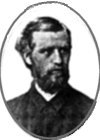Hide
hide
Hide
West Country Poets

REV. DANIEL PRING ALFORD (1838-)
This writer, though not a native of Devonshire is bound to that county by many ties, both of kindred and association, and we therefore feel justified in including him amongst our poets of the West. He is the son of a medical practitioner at Taunton, where he was born November 28, 1838. He is the son of a medical practitioner at Taunton, where he was born November 28, 1838. The late Dean ALFORD was his father's first cousin, and married one of his father's sisters. A sketch of the family may be found at the beginning of Dean Alford's 'Life' by his widow. Mr. Alford was educated at Crewkerne Grammar School and the College School, Taunton. From the latter he went to Exeter College, Oxford, in 1857, and graduated with second-class honours in law and modern history in 1860. He was ordained deacon in 1861, priest in 1862 by Lord Auckland, then Bishop of Bath and Wells; held the curacy of St. John's, Taunton, until he went to Clayhidon in 1863. In 1865 he went to St. Mary's, Isles of Scilly, as Chaplain of the Isles, under Mr. Augustus SMITH, and here he stayed till June, 1869, when he was presented to the living of St. Paul's Gulworthy, near Tavistock. He remained at Gulworthy till November 1878, when he went into Bedfordshire for five years, holding the rectory of Aspley Guise for one year, and the vicarage of Houghton Regis, near Dunstable, for four years. In November, 18883, he came to Tavistock as Vicar, on the resignation of the Rev. W. J. TAIT, which benefice he still holds. In 1864 Mr. Alford had married Charlotte Elizabeth, the eldest daughter of the Rev. O. J. TANCOCK, D.C.L., who was then Vicar of Tavistock. Mr. ALFORD's family have been small landowners and beneficed clergymen in Somersetshire, in the neighbourhood of Langport, for the last three hundred years. At the close of the last century, his great-grandfather was Dean of St. Burian in Cornwall, but he was also Vicar of Curry Rivel, near Langport, and there he lived and died. Two of Mr. ALFORD's first cousins are incumbents in the diocese of Exeter, Henry Powell ALFORD being Vicar of Woodbury, Salterton, and Henry William Powell ALFORD, Vicar of Dawlish. The name POWELL came into the family on the female side early in the seventeenth century. Mr. Alford's mother's brother was Dr. James PRING, of Taunton, a distinguished archaeologist and contributor to the local antiquarian journals.
During his residence at Gulworthy in 1874, Mr. Alford published a volume of poems, entitled 'The Retreat, and other Poems,' several of which have a local colouring. Amongst the most commended of his poetical efforts are 'The Nightingale and the Warblers,' 'The Foxgloves,' 'Those only Know who Love,' 'Light Above,' and 'Snowdrops.' A sonnet to William BROWNE, one of the most noted of Tavistock worthies, the author of 'Britannia's Pastorals,' is exceedingly good. Amongst Mr. Alford's other minor publications we may mention 'England's Royal Jubilees' an address given in the Parish Church, Tavistock, in 1887; 'Piety and Culture,' a sermon preached in 1888; and 'Four Tavistock Worthies of the Seventeenth Century,' a paper delivered before the Devonshire Association at their Tavistock meeting in 1889. In 1891 Mr. Alford published 'The Abbots of Tavistock,' an attempt to connect the history of Tavistock with the general history of England. Mr. Alford's latest work is entitled 'A Tale of Tresco, the Tavistock Chimes, and other Poems, mostly of the West Country' (Tavistock, 1894). It is , as the writer informs us, 'a sheaf from a harvest slowly gathered in, through many years of a very busy life'. The following short pieces will fairly represent Mr. Alford's poetical efforts:
TENNYSON
Our Tennyson, our Poet-Teacher, dead!
But his true words are living all the more.
And life-long students find an ampler store
Of grace and strength in lines so often read.
Silent and still! The moonlight on his bed!
And none to fill his office, though a score,
Not quite unworthy of the wreath he wore,
Are eager for the place he tenanted!-
Our one great poet we must needs bemoan,
The best and clearest mirror of our age,
So skilled in art, so varied in his rhyme/
But though, in this our day, he stood alone,
Worthy successors yet we dare presage,
The Poet-Teachers of a nobler time.
TO WILLIAM BROWNE OF TAVISTOCK
Nature's true poet, blest with fancies sweet,
And voice as swift and changeful as our brooks,
We country swains cast often wondering looks
On those great singers that around thee meet;
For Spenser, Sidney, thy chief teachers were,
And Wither, Drayton, Jonson, called thee friend;
And, like enough, kind Shakespeare did commend
Thy 'modest muse'. And yet we all may share
The scenes of beauty that inspired thy lay;
For still by 'Blanchdown Wood' the Tamar sweeps;
Still trickle streamlets down the 'Dartmoor' steeps,
And sing blithe music to the lambs at play;
Still through 'sweet Ina's Combe' the Walla leaps,
Hurrying to greet the Tavy on its way.
TO A WILD LYCHNIS
Thou long-enduring flower,
To cheer a wintry hour,
Thy lamp still burneth brightly;
Whilst all the flowers beside,
In garden or outside,
Are dead, that were so sprightly.
[.. .. two more verses in the same vein . . .]
Transcribed by Sandra Windeatt from: Wright, W.H.K., (1896) West-Country Poets: Their Lives and Works. London: Elliot Stock, pp.4-6.
